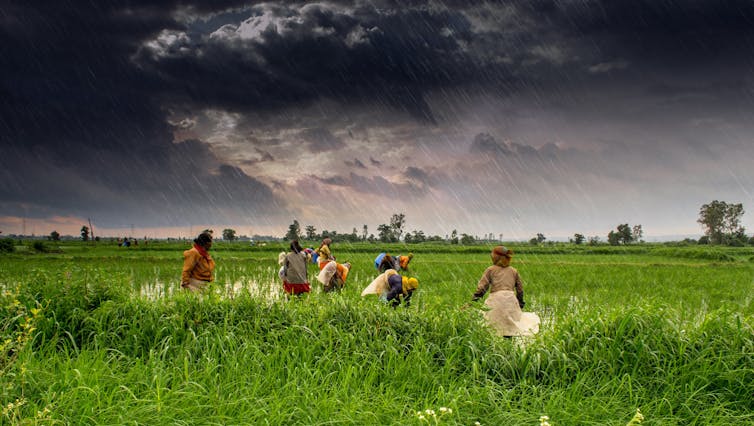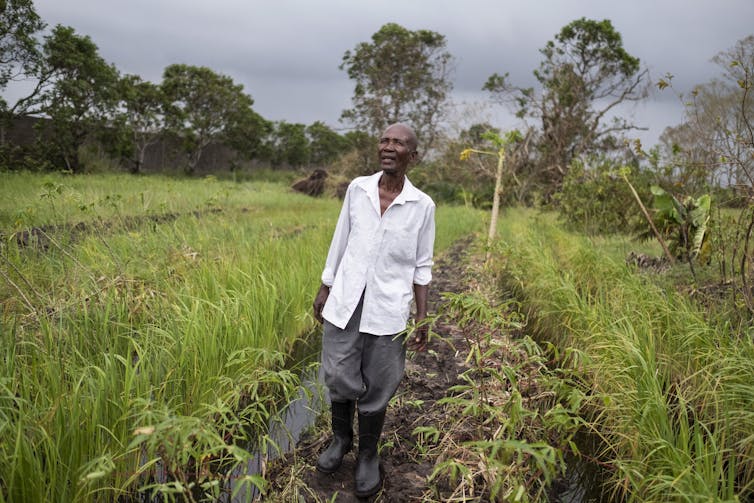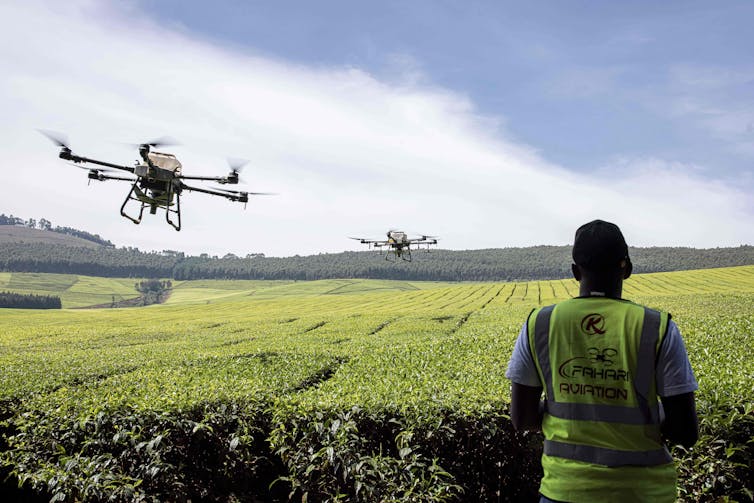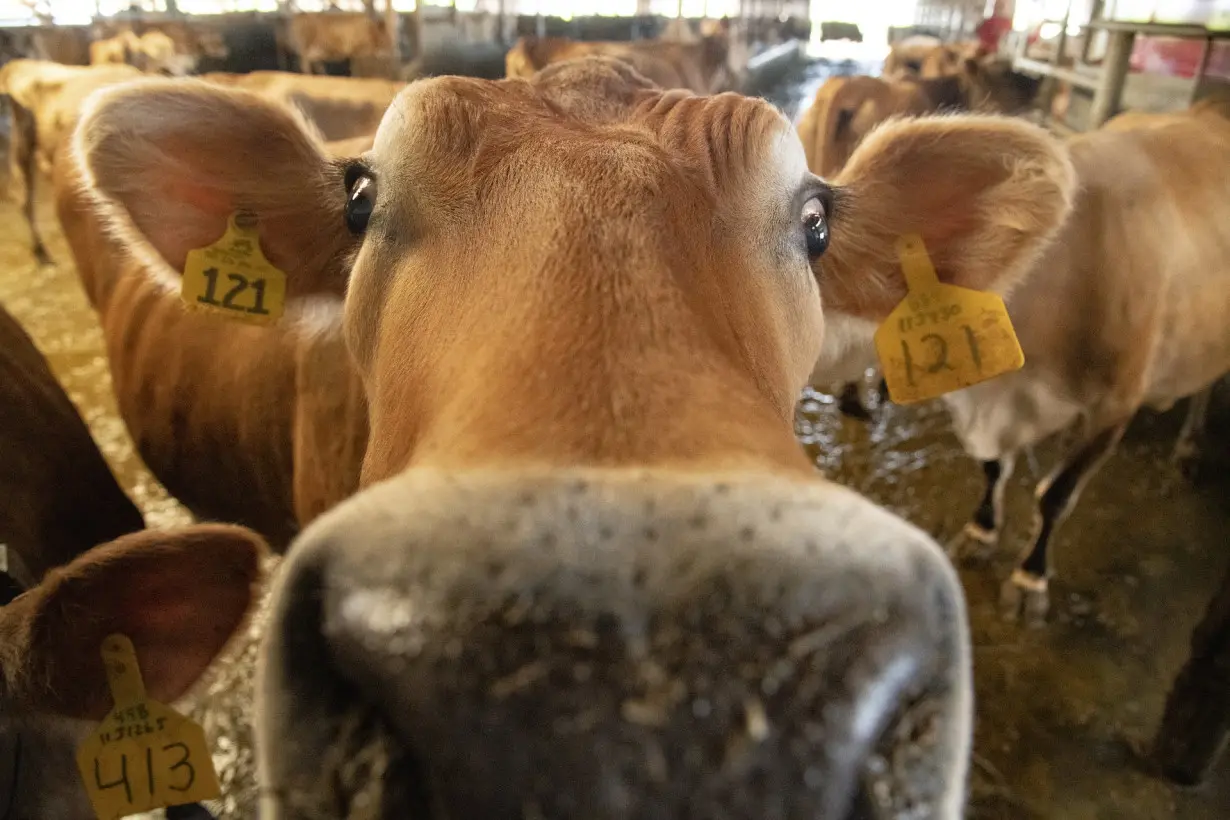For the first time ever, food and agriculture took center stage at the annual United Nations climate conference in 2023. More than 150 countries signed a declaration, committing to make their food systems – everything from production to consumption – a focal point in national strategies to address climate change.
While the declaration is thin on concrete actions to adapt to climate change and reduce emissions, it draws attention to a crucial issue.
The global food supply is increasingly facing disruptions from extreme heat and storms. It is also a major contributor to climate change, responsible for one-third of all greenhouse gas emissions from human activities. This tension is why agriculture innovation is increasingly being elevated in international climate discussions.

At present, agriculture provides enough food for the world’s 8 billion people, although many do not have adequate access. But to feed a global population of 10 billion in 2050, croplands would need to expand by 660,000 to 1.2 million square miles (171 million to 301 million hectare) relative to 2010. That would lead to more deforestation, which contributes to climate change. Further, some practices widely relied on to produce sufficient food, such as using synthetic fertilizers, also contribute to climate change.
Simply eliminating deforestation and these practices without alternative solutions would decrease the world’s food supply and farmers’ incomes. Fortunately, innovations are emerging that can help.
In a report released Dec. 2, the Innovation Commission for Climate Change, Food Security and Agriculture, founded by Nobel-winning economist Michael Kremer, identifies seven priority areas for innovation that can help ensure sufficient food production, minimize greenhouse gas emissions and be scaled up to reach hundreds of millions of people.
I’m an agriculture economist and executive director for the commission. Three innovations in particular stand out for their ability to scale up quickly and pay off economically.
Accurate, accessible weather forecasts
With extreme weather leaving crops increasingly vulnerable and farmers struggling to adapt, accurate weather forecasts are crucial. Farmers need to know what to expect, both in the days ahead and farther out, to make strategic decisions about planting, irrigating, fertilizing and harvesting.
Yet access to accurate, detailed forecasts is rare for farmers in many low- and middle-income countries.
Our assessment shows that investing in technology to collect data and make forecasts widely available – such as by radio, text message or WhatsApp – can pay off many times over for economies.

For example, accurate state-level forecasts of seasonal monsoon rainfall totals would help Indian farmers optimize sowing and planting times, providing an estimated US$3 billion in benefits over five years – at a cost of around $5 million.
If farmers in Benin received accurate forecasts by text message, we estimate that they could save each farmer $110 to $356 per year, a large amount in that country.
More sharing of information among neighboring countries, using platforms like the World Meteorological Organization’s Climate Services Information System, could also improve forecasts.
Microbial fertilizers
Another innovation priority involves expanding the use of microbial fertilizers.
Nitrogen fertilizer is widely used to increase crop yields, but it is typically made from natural gas and is a major source of greenhouse gas emissions. Microbial fertilizers use bacteria to help plants and soil absorb the nutrients they need, thereby reducing the amount of nitrogen fertilizer needed.
Studies have found that microbial fertilizers could increase legume yields by 10% to 30% in healthy soil and generate billions of dollars in benefits. Other microbial fertilizers work with corn, and scientists are working on more advancements.
Soybean farmers in Brazil have been using a rhizobia-based microbial fertilizer for decades to improve their yields and cut synthetic fertilizer costs. But this technique is not as widely known elsewhere. Scaling it up will require funding to expand testing to more countries, but it has great potential payoff for farmers, soil health and the climate.
Reducing methane from livestock
A third innovation priority is livestock, the source of roughly two-thirds of agriculture’s greenhouse gas emissions. With demand for beef projected to rise 80% by 2050 as low- and middle-income countries grow wealthier, reducing those emissions is essential.
Several innovative methods for reducing livestock methane emissions target enteric fermentation, which leads to methane belches.
Adding algae, seaweed, lipids, tannins or certain synthetic compounds to cattle feed can change the chemical reactions that generate methane during digestion. Studies have found some techniques have the potential to reduce methane emissions by a quarter to nearly 100 percent. When cattle produce less methane, they also waste less energy, which can go into growth and milk production, providing a boost for farmers.
The method is still expensive, but further development and private investment could help scale it up and lower the cost.
Gene editing, either of livestock or the microorganisms in their stomachs, could also someday hold potential.
Scaling up agriculture innovation
The Innovation Commission also identified four other priorities for innovation:
Helping farmers and communities implement better rainwater harvesting.
Lowering the cost of digital agriculture that can help farmers use irrigation, fertilizer and pesticides most efficiently.
Encouraging production of alternative proteins to reduce demand for livestock.
Providing insurance and other social protections to help farmers recover from extreme weather events.
While promising agricultural innovations exist, commercial incentives to develop and scale them up have fallen short, leading to underinvestment, particularly in low- and middle-income countries.

However, innovation funding has a track record of generating very high social rates of return. This creates an opportunity for public and philanthropic investment in developing and deploying innovations at a scale to reach hundreds of millions of people. Of course, to be effective, any potential innovation must be consistent with – and driven by – national strategies and planned in conjunction with the government, the private sector and civil society.
Two decades ago, global leaders, frustrated that lifesaving vaccines were not reaching hundreds of millions of people who needed them, created Gavi, The Vaccine Alliance. They invested billions of dollars to scale up these innovations, helped to immunize over 1 billion children and halved child mortality in 78 lower-income countries.
This year, officials at COP28 are aiming for a similar global response to climate change, food security and agriculture.
This article, originally published Dec. 2, has been updated with the declaration’s signatory count as of Dec. 12.

Paul Winters receives funding from the Bill and Melinda Gates Foundation for the work on the Innovation Commission for Climate Change, Food Security and Agriculture. He is Executive Director of the Innovation Commission for Climate Change, Food Security and Agriculture based out of the Development Innovation Lab at the University of Chicago. He also is providing unpaid technical support to the COP28 Presidency Food System Initiative around the Innovation Pillar.
Source: The Conversation



 Managing methane from belching cattle is a top innovation priority.
Managing methane from belching cattle is a top innovation priority.